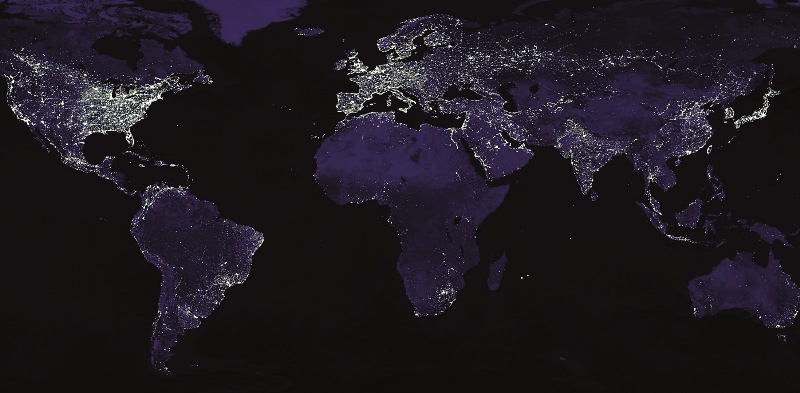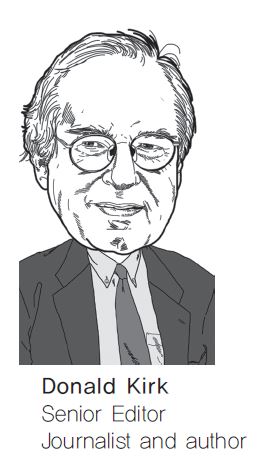문재인 대통령의 ‘핵 없는 한국’ 비전은 수십억의 사람들이 경제·산업 활동뿐 아니라 밤에 불을 켜는 에너지로 원자력을 얼마나 필요로 하고 있는지 그 현실을 무시한 것이다. 석유와 석탄은 공해를 일으킬 뿐 아니라 구하기가 쉽지 않고 운송하기도 어려우며 비싸다.
풍력과 태양력은 대도시에서 필요로 하는 만큼의 전기를 생산해내지 못하고 있다. 그런데 한국 전체 전기공급의 거의 1/3을 차지하는 원자력을 제거하겠다는 문 대통령의 꿈이 미칠 영향이 어떨지 상상해보라.
문 대통령의 이 정책에 대한 유감은 ‘핵’이라는 단어가 인류를 대량살상한다는 의미로 받아들이는 반핵 운동가들 때문에 원자력에서 다른 국제적 경쟁자들에게 뒤처지고 있는 미국에서 강하다. 문 대통령의 이 입장은 원자력의 혜택을 찾아내고 있는 미국인들 가운데 원자력의 미래에 대한 깊은 우려를 낳고 있다.
 |
| ▲ 산업자원부가 이미 대기 중인 23개의 원자로 건설 신청과 신규 6개의 원자로 건설 신청 승인을 모두 거부하면서 향후 한국에 필요한 전기의 절반을 공급하겠다던한국에너지전문가들의꿈은산산이부서졌다./wallpapers |
문 대통령의 탈원전, 미국의 우려
워싱턴에 소재한 ‘핵기반시설위원회’(Nuclear Infrastructure Council) 대표인 데이비드 블리는 한국 뿐 아니라 미국에 분명히 손해를 미칠 이 정책에 깊은 실망을 나타냈다. 그는 내게 보낸 이메일에서 “원자력에서 손을 떼려는 문 대통령의 정책을 보며 매우 착잡하고 도무지 이해할 수 없으며 일반 한국인들의 입장과 분명히 조화를 이루지 않는다”고 안타까워했다.
문 대통령의 마지못한 승인하에 이미 진행 중이었던 2개의 원자로 건설을 마무리한 산업자원부는 문 대통령이 선거공약대로 한국의 오래된 원자력 프로그램을 완전히 제거하겠다는 약속에 불만을 표현하고 있다.
그러나 산업자원부는 이미 대기 중인 23개 원자로 건설 신청과 신규 6개의 원자로 건설 신청 승인을 모두 거부하면서 30개 이상의 원자로를 건설해 전기를 엄청나게 사용하는 한국에 필요한 전기의 절반을 공급하겠다는 한국 에너지 전문가들의 꿈을 산산히 부서뜨렸다.
하지만 문 대통령이 자신의 전임자인 박근혜 전 대통령을 쫓아내고 감옥에 집어넣은 촛불 혁명에서 대중인기 영합적인 메시지로 크게 외친 ‘탈원전 정책’을 얼마나 오랫동안 추진할 수 있을까? “정치적인 동기로 시작한 이 정책은 청정에너지인 원자력의 경제적, 전략 지정학적인 면들 때문에 지속되지 못할 것이라는 게 일반적인 관측”이라고 데이비드 블리는 내게 말했다.
고려해야 할 것이 한국의 유일한 원자로 건설업체인 두산중공업이다. 두산중공업은 한국전력공사를 통해 아랍에미레이트에 200억 달러 규모의 4개 원자로를 건설하고 있다.
한국전력공사와 두산은 다른 곳에서도 동일하게 하고 원자로를 건설하고 싶어하는데 특히 사우디 아라비아에서 더 큰 규모로 원자로를 짓고 싶어한다. 블리는 수조 달러 규모의 원자력 시장에 뛰어들려는 야망을 가진 한국이 정말로 원자력 사업을 버릴 수 있을지 궁금해했다.
워싱턴에 소재한 에너지 데일리(Energy Daily) 창간 편집장인 르웰린 킹은 한국이 원자력 개발에서 빠지면 미국의 이익에 상당히 좋지 않는 영향을 미칠 것이라고 봤다. 그는 “미국 원자력 산업은 한국을 경쟁자로 봤다.
하지만 동시에 좋은 동료로도 본다”며 “미국은 한국과 해외 신규 원자로 건설을 두고 치열한 경쟁을 벌이는 것을 두려워하지만 중국, 러시아 외에 원자력 분야에서 한국이 주요 원자로 공급국가를 있는 것이 건설적인 도움이 된다고 생각했다”고 말했다.
킹은 이런 걱정은 원자로 건설업자들만의 것이 아니라고 말했다. 그는 “한국에 고급원자로 개념과 신규 핵에너지 개발 등에 대한 기술을 제공하고 지원하는 미국 연구소들도 실망하고 있다”고 밝혔다.
킹은 한국의 탈원전은 국제적인 여파가 있다고 분석했다. “문 대통령의 탈원전은 한국 원자력산업 뿐 아니라 세계 모든 원자력 산업에 충격으로 받아들이고 있다”며 “한국이 탈원전을 한다면 다른 사람들은 “한국도 핵 없이 살 수 있다고 생각하고 있다”고 말하고 핵반대자들은 환호하고 나올 것”이라고 지적했다.
“문 대통령은 원자력 산업의 배신자”
킹은 문 대통령의 탈원전 선언을 원자력 산업이 당하고 있는 일련의 아픈 충격 가운데 하나로 봤다. 원자력 회사인 웨스팅하우스가 파산하고 사우스캐롤라이나에 새 원자력 단지 개발이 취소되면서 이미 타격을 입은 미국의 원자력 산업은 문 대통령의 당선과 그의 원자력에 대한 부정적인 입장으로 비틀거리고 있다고 그는 밝혔다.
그는 원자력 산업에 대한 토론회를 주최하는 워싱턴에 소재, 글로벌미국기업연구소(Global American Business Institute)에 기고한 글에서 이를 상세하게 다뤘다. ‘미국 원자력 산업이 한국의 뉴스에 전율하고 있다’는 제목의 글에서 그는 문 대통령이 한국을 원자력에서 더 불확실하고 비용이 많이는 전기의 미래로 바꾸는 결정을 내렸다며 이런 점에서 그를 배신자로 묘사했다.
그는 “문 대통령의 결정은 2011년 3월 11일 쓰나미가 일본 후쿠야마 다이치 원자력 시설을 강타한 후 미국 원자력 산업에 쏟아지고 있는 충격의 하나”라고 밝혔다. 반핵주의자들은 일본의 원자력 재난을 세계 모든 곳의 원자력 발전소가 문을 닫아야 하는 이유로 보고 있지만 미국의 많은 연구소, 대학, 정부기관 등은 한국이 원자력 개발을 계속하기를 희망했다고 그는 말했다.
킹은 한국은 에너지가 부족하기 때문에 원자력이 필요하다고 주장했다. 아랍에미레이트에 짓고 있는 원자로는 한국을 세계적인 원자로 공급자라는 중요한 위치를 마련하게 하고 있다고 말했다.
그러나 한국이 빠지면 원자로 건설은 단지 두 나라, 즉, 중국과 러시아가 다 차지하게 될 것이라고 경고했다. 더욱이 그는 “한국전력공사의 경수로 기술은 어떻게 되는 것인가?”라고 질문했다.
핵기반시설위원회 데이비드 블리는 다소 긍정적인 전망을 갖고 있지만 비슷한 우려를 갖고 있다. “미국의 원자력 시장이 어렵지만 미국은 여전히 세계 원자로의 수도”라며 “우리는 기술개발에서 세계적인 혁신국가이고 세계에서 가장 크고 가장 안전한 원자력 발전소를 운영하고 있다.
우리가 향후 10년 동안 무엇을 하고 무엇을 하지 않느냐에 따라 미국은 이 리더의 자리를 지키느냐 아니면 러시아와 중국의 원자로를 구입하는 자가 될 것인지 결정날 것”이라고 말했다.
블리는 “트럼프 대통령은 미국의 원자력에 재활력을 넣고 확장하라며 명령했고 이미 바른 방향으로 가는 가시적인 조치들을 취하고 있다. 계속 그렇게 될 것”이라고 강조했다.
번역 이상민 미래한국 기자 proactive09@gmail.com
"American nuclear industry quakes at news from South Korea"
Says Llewellyn King, U.S. nuclear energy expert
President Moon Jae-in's vision of a nuclear-free South Korea defies the reality that billions of people need ever more sources of energy not only for commerce and industry but also to turn on the lights. Oil and coal, besides polluting the atmosphere, are often inaccessible, difficult to transport and expensive. Wind and solar power are impossible to produce in the quantities needed for large urban complexes. Imagine, then, the impact of Moon's dream of doing away with a nuclear program responsible for providing nearly one third of South Korea's electricity.
Chagrin over Moon's policy runs strong in the U.S., in danger of falling behind international competitors as the global leader in nuclear power thanks to antinuclear zealots to whom the word "nuclear" denotes the mass destruction of humankind. Moon's attitude reinforces deep concerns about the future of nuclear energy among Americans responsible for pioneering a blessing for all.
David Blee, executive director of the Nuclear Infrastructure Council in Washington, leaves no doubt of his disappointment over a policy that is sure to damage American as well as Korean interests. As he lamented in an email to me, "President Moon's retreat on nuclear energy is perplexing, inexplicable and clearly out of step with the South Korean public."
The energy ministry's decision, with Moon's reluctant approval, to complete two reactors already under construction shows qualms about his promises, during his election campaign, to do away entirely with Korea's longstanding nuclear power program. The ministry refused, however, to approve plans for six more reactors in addition to 23 already on line, shattering the vision of Korean energy experts for more than 30 reactors fulfilling half the industrialized country's voracious appetite for electricity.
How long, however, can Moon pursue an antinuclear policy loudly proclaimed in populist speeches during the Candlelight Revolution that resulted in the ouster and jailing of his conservative predecessor, Park Geun-hye? "The conventional wisdom" Blee told me "is that his politically motivated pause is unsustainable against the weight of nuclear's economic, clean energy and geo-strategic attributes."
One obvious consideration is that Korea's Doosan Heavy Industries, Korea's lone produce of reactors, is building four of them for the United Arab Emirates - a $20 billion deal, via the Korea Electric Power Corporation, that KEPCO and Doosan would love to duplicate elsewhere, notably in an even bigger deal with Saudi Arabia. Can Korea really abandon the nuclear power industry, Blee wonders, given its "global ambitions in the multi-trillion-dollar nuclear energy marketplace."
Llewellyn King, founding editor of "Energy Daily" in Washington, paints a grim picture of the impact on American interests of Korea's retreat from nuclear energy. "The U.S. nuclear industry had come to view South Korea's as competition but also as a companion in arms," he told me. "While they feared intense competition in services and new building overseas, they also thought it was constructive to have a major supply-country in the game besides China and Russia."
Anxiety goes beyond manufacturers, said King. "There also is a feeling of disappointment in the U.S. national laboratories, several of which have contributed and continue to contribute to technology in South Korea, particularly in advanced reactor concepts and the development of new nuclear fuel."
King sees the South Korean retreat as having global implications. "The feeling across the industry is that a blow to the South Korean nuclear industry is a blow to nuclear everywhere" he said. "If the South Koreans abandon the field, others will say, 'Even South Korea thinks it can do without nuclear,' and that will be trumpeted by nuclear opponents everywhere. The sense of moral abandonment has totally displaced any joy that a high-flying competitor may have its wings clipped."
King places the shock of Moon's nuclear policy in the context of a series of bitter blows. The U.S. nuclear industry, already suffering from the bankruptcy of Westinghouse Electric and cancellation of a nuclear power plant in South Carolina, he wrote, "was sent reeling by the Moon election and his negative approach to nuclear."
He elaborated still more in an article for GABI, the Global American Business Institute in Washington, which often stages discussions on the nuclear industry. "American Nuclear Industry Quakes at News from South Korea" was the title of the article, portraying Moon as almost a traitor for deciding "to turn the country away from nuclear power to a more uncertain and expensive electricity future."
The decision, King wrote, was "one of an accumulation of blows that have rained on the U.S. nuclear establishment since the tsunami hit the Fukushima Daiichi Power Plant on March 11, 2011." While the antinuclear crowd sees the disaster in Japan as reason to shut down nuclear power plants everywhere, Americans "including the nuclear navy, the national laboratories, the universities, many government agencies and the regulators had hoped that South Korea would continue to hold the nuclear torch."
Korea "needs nuclear because it is energy poor" King argued, and the plant being built in the UAE "puts South Korea in a driving position as another global vendor." Otherwise, he warned, "new reactor construction will be dominated by just two countries: China and Russia." Moreover, he asked, "What will become of the evolving light water technology of Korea Electric Power Corporation?"
David Blee at the Nuclear Infrastructure Council takes a somewhat more optimistic view but shares similar concerns. "Notwithstanding the current US market challenges, America remains the nuclear energy capital of the world" he said in his email. "We are the world innovator in technology development and have the largest best operating and safest fleet in the world. What we do or don't do in the next 10 years will dictate whether the US maintains its leadership or if we will be buying Russian and Chinese reactors."
President Trump, Blee noted, "has ordered the development of a plan to revitalize and expand American nuclear energy and has already taken some tangible step steps in the right direction…. So stay tuned."

외부게재시 개인은 출처와 링크를 밝혀주시고, 언론사는 전문게재의 경우 본사와 협의 바랍니다.


